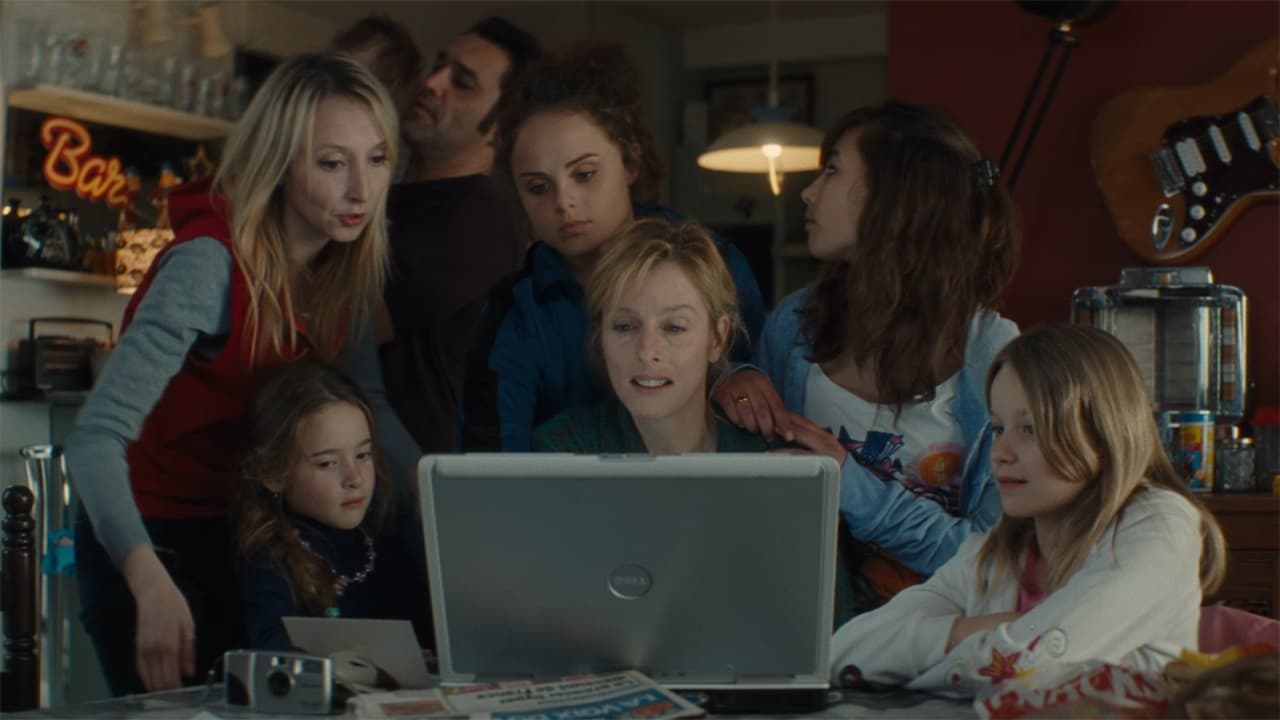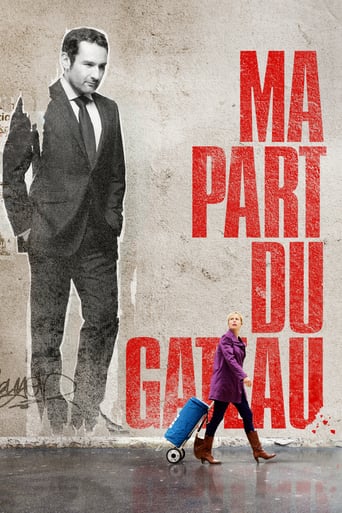



I love this movie so much
Just what I expected
A Disappointing Continuation
I enjoyed watching this film and would recommend other to give it a try , (as I am) but this movie, although enjoyable to watch due to the better than average acting fails to add anything new to its storyline that is all too familiar to these types of movies.
View MoreAccording to the description and critical reviews, one would think that "My Piece of the Pie" is about class issues, and how a single mother (France), dropped from the payroll because her company in Dunkirk has been wrecked by financial manipulation in high places, fights back.Most of the movie is a set-up for the hasty and unpleasant conclusion. This set-up is very well done (therefore 3 stars), and one has expectations for a satisfactory resolution. The heroine seeks temporary employment as a housekeeper in Paris, and near the conclusion discovers that her wealthy and self-centered employer (Steve) not only has taken advantage of her sexually, but was actually one of the financial wizards responsible for destroying the Dunkirk company she worked for originally.At this point, the tale goes downhill very fast and crashes at the bottom.The way heroine France fights back is to impulsively kidnap Steve's adorable son Alban, who has been entrusted to her care. Furthermore, when Steve arrives with police to rescue the son, she and other Dunkirk workers resist and physically assault the young financier. Not only does she break the law, but her former co-workers will certainly be in legal hot water as well. Why would they become involved? Kidnapping children, whatever the rationale, is a particularly heinous crime. The darkness of this ending eclipses any lessons about class conflict or capitalist predation, and deflects attention from Steve and his questionable antics. In my opinion, this plot needs major rework on its conclusion to merit film critic Amy Taubin's curious rating as "Brilliant Social Satire".
View MoreThis movie starts out as a pleasant French romantic/comedy along the lines of "Pretty Woman" and "Maid in Manhattan" and you're lead to believe the villain will redeem himself and the heroine will win her man,much like Julia Roberts did with Richard Gere. It doesn't end up so,leaving one with a very disquieting feeling at the end as if the rug has been pulled out from under you.Maybe this is supposed to reflect the way the real world works,but after the wonderful initial set up,in the end you do feel like you've been set up.It inevitably seems under written with a need for a final chapter.Until it shifts gears though, it works,and you feel like you're in for another classic French romance.Even up to the very end you feel like it will shift back to it's light comedy form and everybody ends up happy,(American films do it all the time)but it steers it's way down a darker path of questionable value. I would still recommend this film just for the performance of Karin Viard,who plays France.
View MorePuzzled by the negative reviews of this truly amazing movie about class issues - the way wealthy people live in a "virtual world" where real people are somehow not affected by their decisions to make more money based on the flick of a button on a computer. The film is about how poor people have a necessary need to come together and fight back. Her decision to take the child to Dunkirk in order to get him to face what he has done (buying a business in order to destroy it; shades of Mitt Romney at Bain Capital) allows the community to come together to try to protect her. It's also important to notice that the police are used for repressive purposes to help those in power and not to help those who are hurting.The performances are top-notch, especially Karin Viard as France. She is bold, impulsive, not always nice, bright, intuitive, curious - a fully rounded woman trying to cope with dire economic circumstances.Far from lazy, Cedric Klapisch does a fantastic job of moving back & forth between two very different worlds of haves and have-nots - in fact, I found myself completely engrossed in both worlds inhabited in this film.My interest didn't lag for a single moment. I highly recommend that you see for yourselves and look at it from the p.o.v. not of "reality", but of possibility. I absolutely loved this movie!!! (: Enjoy!
View MoreMost of "My Piece of the Pie" functions as an odd-couple story with a timely edge on class structure and the status of the world's economy. These initial sections of the film are routine and structurally and thematically predictable, but at least they hold their own with some decent performances and a few well-placed moments of levity. But then we're smacked upside the head with a final act that's unpleasant, grossly implausible, and painfully misguided in its efforts to make a statement. It starts with that most reliable of plot devices, a surprise twist, and finishes ambiguously, satisfying writer/director Cédric Klapisch's desire to symbolically reveal the state of the world we live in. I'm not here to say that he isn't making a valid point. He is, however, going about it the wrong way.It begins in the French seaside village of Dunkirk, where, thanks to outsourcing, a factory has just been shut down. For the aptly named France (Karin Viard), a blue-collar worker, the news comes as a devastating shock, and she's introduced lying in a hospital bed after a failed suicide attempt. She's a single mom with three children, and she's now faced with the task of finding a new job. She decides to travel to Paris, where she trains to become a housekeeper. Getting her into the program requires some fudging of the truth, as it's specifically designed for immigrant women; she gets through with a Russian accent and a booming personality. She's then assigned to the luxurious apartment of a wealthy power broker named Steve (Gilles Lellouche), who has just returned to Paris after living in London for ten years.Steve is handsome, but he's also cocky, and he doesn't know the first thing about relating to women. This is evidenced by an unnecessary scene in which he tries to woo a French model by taking her on a trip to Venice, where he lavishes her with expensive gifts. He is, of course, only interested in sex, and he takes great offense when the young woman announces that she never makes love on the first date. She is but one of several women in his life. It seems the only thing Steve does know how to do is make money. France notices this, and after a very short period of time, she feels bold enough to dispense her wisdom about women. The surprising thing is that he seems willing to listen – and this is after introducing himself to her as the workaholic hardass.The situation begins to change after the unexpected revelation that Steve is the father of a little boy named Alban (Lunis Sakji). The kid is dropped off by his mother, who's about to go away on a month-long vacation to Thailand. Naturally, Steve completely forgot about this arrangement. He's now faced with taking care of a child, which he doesn't know the first thing about. Luckily, he has France, who has experience with children. He promotes her to the position of nanny, with a 100-euro salary increase as an incentive. France is thrilled by the extra money, although it comes with an unfortunate tradeoff, namely spending more and more time away from her own children, who she used to visit every weekend. In the process of staying in Paris, France pushes Steve inch by inch towards becoming a respectable man; he learns about communicating with women, he begins to appreciate his son, and he finally admits that being rich isn't making him happy.On the basis of what I've just described, you'd think this movie would do just fine as a Hollywood romantic comedy. But don't be too hasty. There's a darker side to this story, and it reveals itself not long after the aforementioned plot twist. It's founded on an innately cinematic coincidence, which would be fine were it not for the fact that Klapisch was striving for a realistic depiction of current economic conditions. What begins as implausible quickly becomes unsavory, as we learn that neither Steve nor France are as innocent as they initially seemed. We then end on an unresolved, highly unsatisfying note. There's nothing wrong with refusing to tie up stories in neat little packages, although it helps if you make sure the tone is balanced out along the way.To be sure, I know what Klapisch is trying to say: Globalization and the digital revolution have stripped the industrial world of any value it once had, thus creating a rift between finance and labor. And of course, we all want our piece of the pie. What I don't understand is why Klapisch had to make this statement in this particular way. I find it hard to accept when it relies on an ending that requires not only tremendous suspension of disbelief but also a different, less sympathetic viewpoint of its main characters. "My Piece of the Pie" has a few well-written moments, and I certainly enjoyed the performances by Viard and Lellouche, who do have natural on screen chemistry. Unfortunately, the way it ultimately delivers its message does a lot more harm than good.-- Chris Pandolfi (www.atatheaternearyou.net)
View More